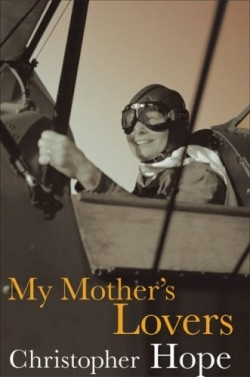
My Mother's Lovers
Alexander is obsessed with air—how to move it, heat it, cool it and clean it. In late twentieth-century South Africa, where millions crumble under weighty issues such as race, colonialism, revolution and AIDS, Alex clings to nothing. His mother is none too pleased. “‘Oh dear me,’ she said, ‘Air? I really wish you wouldn’t.’”
Hope’s ninth novel is rife with this kind of overt symbolism. White policemen detonate explosives to kill a group of majestic beached whales. A former revolutionary turned conservative inherits a cache of old escape routes as a reminder of his hypocrisy. Fortunately, the author’s humor and inventiveness keep the novel from succumbing to cliché. Alex Healey is a wry and observant narrator, recalling the violent power-grab of the Boer War with the same cynicism that he uses to dissect his cigar-smoking, buffalo-hunting, Stinson-flying mother. As he struggles to understand his elusive national and family heritage, Alex toys with his readers’ stereotypes and challenges their concept of justice, creating a rich psychological history of one of the most troubled regions in the world.
Born in Johannesburg in 1944, Hope won the Whitbread Prize for Fiction for his novel Kruger’s Alp; while Serenity House was short-listed for the Man Booker Prize. Readers accustomed to the South Africa portrayed by authors such as J.M. Coetzee will find that Hope is a different animal altogether. While the former’s storytelling is loaded with silent intensity, Hope’s opinions explode onto the page. He is more of a teller than a shower, and although his ideas are provocative they can also feel digressive and overwhelming at times. The colorful characters that carry this story—including historic personalities such as Ernest Hemmingway, Beryl Markham, Albert Schweitzer, and Karen Blixen—seem more like types than real individuals, and the author uses them accordingly as springboards for various philosophical musings.
Still, one must assume that this exercise is intentional. The fickle nature of identity is a recurring theme throughout the novel as people try on new personas like winter coats to fit the turbulent circumstances of their lives. The Healeys’ conservative gardener turns to boozing and hookers when he discovers that his wife has slept with another man, while Alex’s girlfriend transforms from a jaded suburbanite into a figure of forgiveness after becoming obsessed with rehabilitating her son’s murderers.
The only constants in this shifting landscape of national borders and identities are Alex’s mother Kathleen and Africa herself. Tender and savage, each is blind to race and evokes fierce love in others without overtly giving back. In this context, the title of the book takes on a different meaning. My Mother’s Lovers refers to every merchant, missionary and dreamer in Africa who hunts for a place to call home.
Reviewed by
Aimee Sabo
Disclosure: This article is not an endorsement, but a review. The publisher of this book provided free copies of the book to have their book reviewed by a professional reviewer. No fee was paid by the publisher for this review. Foreword Reviews only recommends books that we love. Foreword Magazine, Inc. is disclosing this in accordance with the Federal Trade Commission’s 16 CFR, Part 255.
